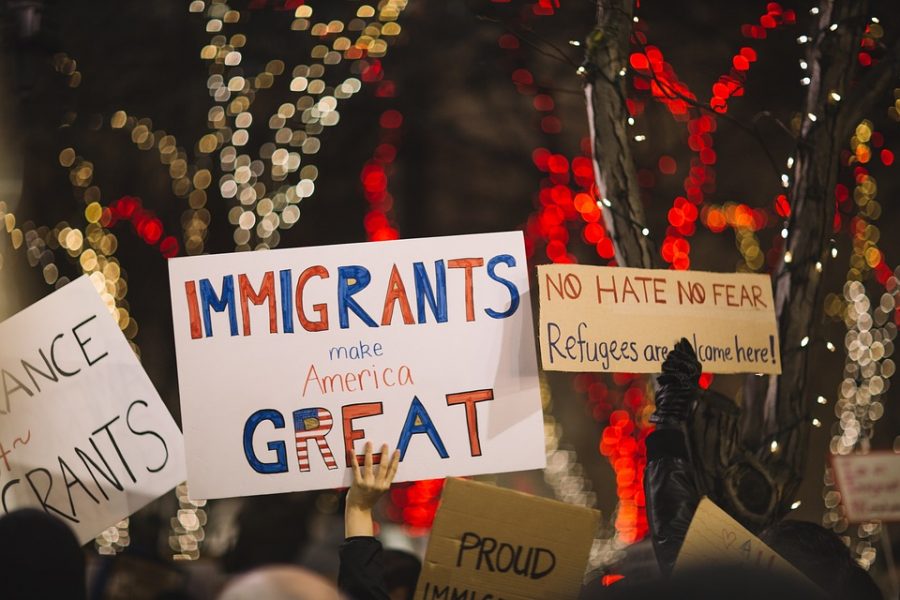Immigrants Make America Great
http://maxpixel.freegreatpicture.com/
People Us Protest Posters Immigrants Rally
What does it mean to be an American?
For some, it means working hard to better our economy and society, pledging allegiance to a flag with your hand on your heart, and giving thanks to veterans for fighting for our freedoms. For others, it means being born and raised here, speaking English, and supporting the government no matter what.
But often times, Americans forget the one fundamental aspect that makes the United States so unique: the fact that not only was this country founded and advanced by immigrants, but the majority of Americans are either immigrants or descendants of immigrants. Even Alexander Hamilton, the first Secretary of Treasury, was born and raised in the West Indies before he arrived in America as a poor orphan and made something of himself.
“When my grandfather immigrated here, he was one of thousands fleeing from WWII, so [it was a time when] the country felt an obligation to help as many people as they could. I feel that back then more people believed in the ‘melting pot’ image of America and didn’t feel as threatened by immigrants,” senior Kyra Salamon said. “Now, many years later, I think more and more Americans have gone back to their prejudiced ‘protective modes,’ and they feel the need to protect their safety, their jobs, and keep the crime rate down.”
In early September, President Donald Trump began working to cancel Deferred Action for Childhood Arrivals (DACA), which grants temporary work permits and lawful immigration presence to over 800,000 undocumented immigrants who were brought to this country before the age of 16. Only a couple weeks later, the U.S. Immigration and Customs Enforcement (ICE) reported that they arrested 498 individuals from 42 countries for federal immigration violations in multiple sanctuary cities across the U.S. during a four-day operation. The Trump administration claims to prioritize deporting those with serious criminal records, but new policies also take aim at unauthorized immigrants who commit minor crimes, such as driving without a license or using a fake Social Security number.
“There’s a lot of controversy right now over illegal immigration, especially over immigrants who have been here for many years and feel more like an American than a citizen from their native country,” Spanish teacher Ms. Jessica Swartz said.
Whether we like it or not, undocumented immigrants are part of this country, too. Americans should not fear them, but work to help them by creating paths to citizenship and reforming the current immigration process in order to make legal immigration a feasible option for desperate immigrants. According to the Migration Policy Institute, most illegal immigrants are “productive, law-abiding members of society, deeply rooted in communities all over the country, working hard, living quietly, paying taxes and raising families,” and 60 percent have been here for at least 10 years. Only 7.5 percent of undocumented immigrants currently living in the country have been convicted of a crime, which certainly contradicts President Trump’s narrative that illegal immigrants are Mexican “rapists” and “killers.”
“I believe that the acceptance of immigrants to this country is what makes our nation strong,” Salamon said. “My grandfather is not the only immigrant who has had an accomplished life and who has contributed to American society; there are many people off of whose efforts we are all reaping the rewards.”
Furthermore, illegal immigrants can’t simply “get in line” to come here legally. A 2006 Pew Hispanic Center study found that 45 percent of the total undocumented immigrant population initially entered the country legally, but simply overstayed their visas.
“There’s obviously a much greater demand or desire for people to come here than there are legal means necessary. I think we have to decide how to address that in a way that reduces these issues of illegal immigration,” social studies teacher Mr. Tom Beaupre said, “because it’s quite obvious that there are people who wanna come here for many different reasons, whether it’s financial, to be with family, to get away from bad situations in their home country… and because we restrict the number of people who come here legally, we fail to deal with this legal issue.”
According to the American Immigration Council, in order to come to the U.S. for employment purposes, immigrants must already have a job offer from an American employer who is willing to sponsor them. Additionally, most of the qualifying professions for immigration require high levels of education and professional experience, which makes it difficult for less skilled workers to take the legal route. In a 2015 report, the Pew Research Center said the majority of undocumented immigrants hold more low-skill jobs than high-skill jobs.
Furthermore, according to the American Immigration Council, most people fleeing their native countries are unable to access humanitarian protection. To be admitted as refugees, immigrants must undergo vetting processes conducted by international and U.S. agencies, and prove that they have a “well-founded fear of persecution based on race, religion, membership in a particular social group, political opinion, or national origin.” However, perhaps the largest issue with this legal route is the fact that an immigrant cannot qualify as a refugee because of difficult economic conditions in their native country.
What our immigration system needs is a legal route that allows more workers escaping inadequate economic conditions to legally immigrate to the U.S. even if they don’t meet exceptionally high standards of education and professional experience. Contrary to popular belief, low-skill workers actually help the American economy.
Giovanni Peri, an economist at the University of California, found that from 1990 to 2007, undocumented low-skill workers increased high skilled workers’ pay by roughly 10 percent. According to a report by Ben Gitis, director of labor market policy at American Action Forum (a right-leaning Washington research group), and Jacqueline Varas, mass deportations would reduce real gross domestic product (GDP) by over $1 trillion, private sector employment could fall to as low as 4 million workers, and private industry output would be reduced to between $381.5 billion and $623.2 billion. In simpler terms: the labor force would take a significant hit.
All immigrants should be able to pursue the American dream, and to one day have the opportunity to achieve greatness. We must ensure that the words on the Statue of Liberty, words that capture our country’s essence as a diverse fusion of cultures and a land of opportunity, continue to ring true: “Give me your tired, your poor / Your huddled masses yearning to breathe free.”

Senior Sarah Trebicka is a four-year staff reporter and former two-year Our World editor, now serving as editor-in-chief for the Spotlight. In addition...


